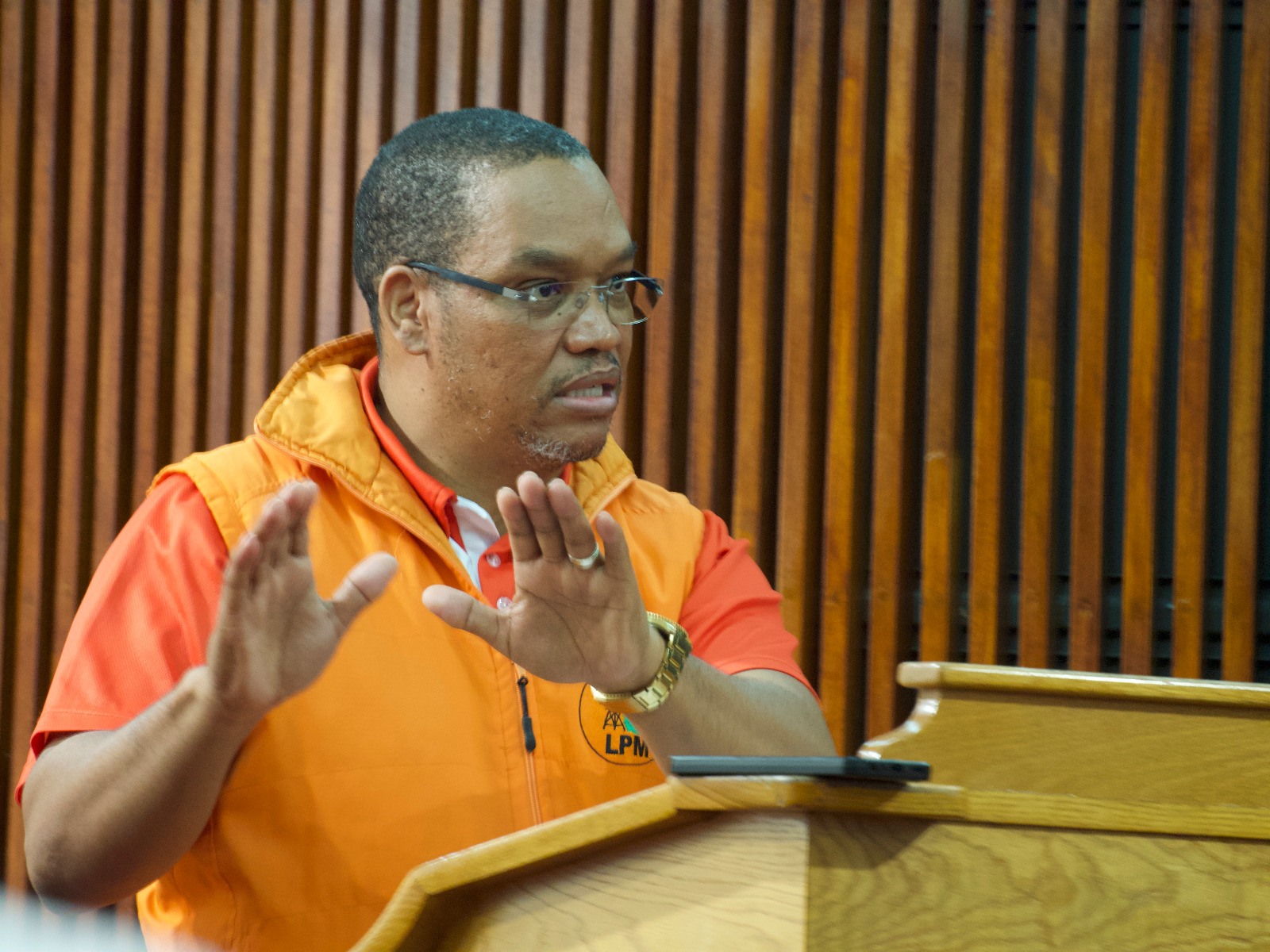SEVENTEEN years after Independence, Namibia finally has an official HIV-AIDS policy, which the National Assembly adopted last week.
Health Minster Dr Richard Kamwi tabled the 40-page document a month ago, but the short debate, in which very few members participated, only took place last week. The policy allows no discrimination in society or at the workplace against people living with AIDS, and provides comprehensive guidelines for co-ordination of treatment, prevention, impact mitigation, monitoring and research of the disease, which – according to statistics – has infected some 230 000 Namibians, mostly between the ages of 15 and 49.The policy also stipulates that prisoners, people awaiting trial and prison staff must have access to the same HIV-related information, education, counselling and treatment “as available in the general population”.This is a sharp U-turn compared to a few years ago, when the Cabinet Minister responsible for prisons declared in Parliament that prisoners did not receive condoms, because they “do not have sex in prisons”.In her contribution last week, Information Minister Netumbo Nandi-Ndaitwah said there was still room for improvement with regard to social grants for orphans who lost both parents.Policies and laws made it more difficult for them to receive grants than those children who lost one parent only.”The law or policy in place does not regard the context of extended family support and weakens the care-giving functions of the extended family,” Nandi-Ndaitwah said.”I am, however, happy that the HIV-AIDS policy considers circumstances regarding customs, culture, religions and traditions,” she added.The policy noted that polygamy, widow inheritance and forced sex for boys and girls coming of age increased the risk of HIV infection.Government will, in co-operation with civil society, religious and traditional healers, promote monogamous relationships and let women make empowered decisions and choices regarding widow inheritance.It will also provide support services to those Namibians victimised for rejecting harmful traditional practices like widow inheritance.Government will also sensitise traditional leaders on the dangers of some customary practices such as death cleansing, forced sex for children reaching puberty and dry sex.”Customary practices, which involve the use of blades, needles or other skin-piercing instruments such as scarring, tattooing, circumcision and ear piercing shall be done safely using new needles or blades to prevent HIV infection,” the policy states.Elma Dienda of the opposition CoD wanted to know if Government would provide new and sterilised needles or blades for those traditional healers.”The policy document should also include a paragraph on charismatic churches, as they often make false claims that they can cure HIV-AIDS.These churches should be sensitised as well, as they bring false hopes to people living with the disease,” Dienda told the House.”I am also aware that male condoms are freely available or for sale, but female condoms are continuously out of stock, this should change.”She further proposed that the policy should be translated into different languages and made available to communities free of charge.Dienda further proposed that authorities should map out a universal HIV-AIDS workplace policy instead of letting each company and ministry work out its individual policy, which would take much longer.Swapo MP Reggie Diergaardt suggested that the provision of anti-retroviral treatment (ART) should not be done by Government alone, but also by NGOs to relieve the burden on Government health officials and speed up the rollout of ART.NGOs often operated in remote areas where Government services did not reach, he added.McHenry Venaani of the DTA said he found it strange that Government had put in place three medium-term action plans against AIDS before drawing up a policy.”This was like putting the cart before the horse,” he said.Venaani noted that women were often denied the right to refuse their husbands sex because of traditional customs, but husbands often infected their wives because they had extra-marital sex.”When our wives or partners ask us menfolk to use a condom, we start accusing them of various things, instead of making use of a condom in a marriage,” he said.In his response at the end of the debate, Health Minister Richard Kamwi said a mid-term review of the Third Medium-Term Action Plan (MTP3) against HIV-AIDS would be held later this year.”One of the biggest challenges however remains and that is stigma, is denial and is discrimination meted out to people living with or affected by HIV-AIDS,” Kamwi said.”This requires of us as parliamentarians and political leaders to be the first ones to break this barrier.As painful as it may be at times, if we as elected leaders do not have the courage to speak about this disease or to embrace our people living with HIV-AIDS, who will?” Kamwi announced that female condoms would be made more readily available and even be distributed free of charge soon.”We are also aware at the Ministry that not enough is done to fight HIV-AIDS at the workplace, be it companies, parastatals or our line ministries.At this stage, there is simply not enough of a response in the sphere of work in Namibia,” he said.The policy allows no discrimination in society or at the workplace against people living with AIDS, and provides comprehensive guidelines for co-ordination of treatment, prevention, impact mitigation, monitoring and research of the disease, which – according to statistics – has infected some 230 000 Namibians, mostly between the ages of 15 and 49.The policy also stipulates that prisoners, people awaiting trial and prison staff must have access to the same HIV-related information, education, counselling and treatment “as available in the general population”.This is a sharp U-turn compared to a few years ago, when the Cabinet Minister responsible for prisons declared in Parliament that prisoners did not receive condoms, because they “do not have sex in prisons”.In her contribution last week, Information Minister Netumbo Nandi-Ndaitwah said there was still room for improvement with regard to social grants for orphans who lost both parents.Policies and laws made it more difficult for them to receive grants than those children who lost one parent only.”The law or policy in place does not regard the context of extended family support and weakens the care-giving functions of the extended family,” Nandi-Ndaitwah said.”I am, however, happy that the HIV-AIDS policy considers circumstances regarding customs, culture, religions and traditions,” she added.The policy noted that polygamy, widow inheritance and forced sex for boys and girls coming of age increased the risk of HIV infection.Government will, in co-operation with civil society, religious and traditional healers, promote monogamous relationships and let women make empowered decisions and choices regarding widow inheritance.It will also provide support services to those Namibians victimised for rejecting harmful traditional practices like widow inheritance.Government will also sensitise traditional leaders on the dangers of some customary practices such as death cleansing, forced sex for children reaching puberty and dry sex.”Customary practices, which involve the use of blades, needles or other skin-piercing instruments such as scarring, tattooing, circumcision and ear piercing shall be done safely using new needles or blades to prevent HIV infection,” the policy states.Elma Dienda of the opposition CoD wanted to know if Government would provide new and sterilised needles or blades for those traditional healers.”The policy document should also include a paragraph on charismatic churches, as they often make false claims that they can cure HIV-AIDS.These churches should be sensitised as well, as they bring false hopes to people living with the disease,” Dienda told the House.”I am also aware that male condoms are freely available or for sale, but female condoms are continuously out of stock, this should change.”She further proposed that the policy should be translated into different languages and made available to communities free of charge.Dienda further proposed that authorities should map out a universal HIV-AIDS workplace policy instead of letting each company and ministry work out its individual policy, which would take much longer.Swapo MP Reggie Diergaardt suggested that the provision of anti-retroviral treatment (ART) should not be done by Government alone, but also by NGOs to relieve the burden on Government health officials and speed up the rollout of ART.NGOs often operated in remote areas where Government services did not reach, he added.McHenry Venaani of the DTA said he found it strange that Government had put in place three medium-term action plans against AIDS before drawing up a policy.”This was like putting the cart before the horse,” he said.Venaani noted that women were often denied the right to refuse their husbands sex because of traditional customs, but husbands often infected their wives because they had extra-marital sex.”When our wives or partners ask us menfolk to use a condom, we start accusing them of various things, instead of making use of a condom in a marriage,” he said.In his response at the end of the debate, Health Minister Richard Kamwi said a mid-term review of the Third Medium-Term Action Plan (MTP3) against HIV-AIDS would be held later this year.”One of the biggest challenges however remains and that is stigma, is denial and is discrimination meted out to people living with or affected by HIV-AIDS,” Kamwi said.”This requires of us as parliamentarians and political leaders to be the first ones to break this barrier.As painful as it may be at times, if we as elected leaders do not have the courage to speak about this disease or to embrace our people living with HIV-AIDS, who will?” Kamwi announced that female condoms would be made more readily available and even be distributed free of charge soon.”We are also aware at the Ministry that not enough is done to fight HIV-AIDS at the workplace, be it companies, parastatals or our line ministries.At this stage, there is simply not enough of a response in the sphere of work in Namibia,” he said.
Stay informed with The Namibian – your source for credible journalism. Get in-depth reporting and opinions for
only N$85 a month. Invest in journalism, invest in democracy –
Subscribe Now!










